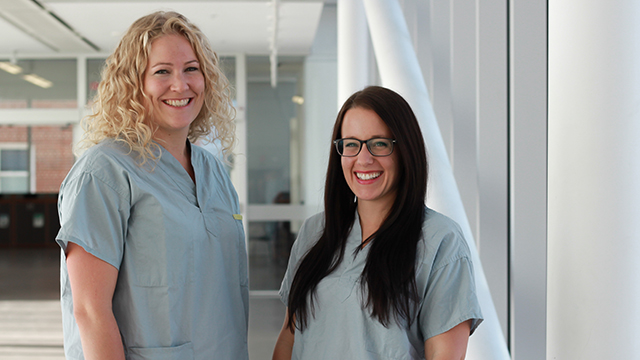
Obstetrics and gynecology residents Shawna Stafford and Ashley Demsky are taking on research to improve care for women with obesity.
Get to know Ashley Demsky and Shawna Stafford, some of the first obstetrics and gynecology residents at the University of Alberta to pursue clinical research through the Clinical Investigator Program.
Why did you decide to pursue clinical research?
Stafford: Obstetrics and gynecology is a very labour-intensive specialty. We spend a lot of time caring for patients on the wards, delivering babies and doing surgeries, so there isn't a lot of time to explore research questions that come up as you meet patients.
Ever since medical school I have been fascinated by obesity. It's becoming more common and affecting younger people. We see it in obstetrics and gynecology. This formerly low-risk population has morphed into a high-risk population. We don't have enough information to adequately assess and treat these patients, so we end up treating them like normal-risk patients. Whether or not that's appropriate, we don't know.
Hopefully we can close the knowledge gap a little by doing some research..
Demsky: When we were in medical school there was very limited training in obesity, so we were both unsure how we were going to mold something that we were very passionate about into our careers. Even when you get into residency, despite at least a quarter of your population having this chronic disease, there's very little teaching in it. We thought we could create that.
What are your research projects?
Stafford: My project is a qualitative research study looking at weight stigma in women's health care. When people come in to receive care they should get treatment equally regardless of their size. It's been well documented that persons with obesity are increasingly being stigmatized because of their size.
I want to explore where that stigma comes from. I want to see if it's because we are under-resourced, so we don't have the appropriate chair or blood pressure cuffs that fit these patients or beds that are safe and large enough to be comfortable. I want to talk to physicians, nurses and residents about patients with obesity and understand if it's about resources or other factors. Once we understand that, we can better address weight stigma and intervene and prevent it.
Demsky: My project came to be after a discussion with Dr. Arya Sharma. He developed the Edmonton Obesity Staging System that's been used successfully in non-pregnant populations to assess risk, mortality and poor health outcomes. He was eager to connect with us. My goal is to modify it and develop it for the pregnant population. What I'll be doing is a two-part project. The first part is looking retrospectively at our population of pregnant women and seeing if we can better assess their risk with a new modified version of the scale, because we know body mass index is not always a good indicator for adverse health outcomes.
The second part is applying that scale to patients who are having labour induced, to see if we can predict more accurately which patients will end up with a cesarean delivery versus a vaginal delivery. It also gives us a chance to look back and see if there was a time where we could have intervened to avoid a cesarean delivery.
How does research affect your day-to-day practice?
Stafford: I think we are both more acutely aware when we have patients with obesity. We are starting to notice it more and more. We appreciate and see how far-reaching this chronic disease is, even in young women of childbearing age.
Demsky: It makes me reflect a little bit more about why I am making the decisions I am making to make sure there is no level of inherent bias. I also want to make evidence-based decisions, and since most studies aren't done with this population, it makes me more interested in exploring these research questions.
Do you want to continue practicing in obesity medicine throughout your career?
Demsky: Ideally, we would like to work together. We would like to do a general OB/GYN practice, but be able to serve the population with obesity.
The goal is to share the knowledge we collect and mentor other colleagues so these patients are being taken care of as best as possible.
How do you balance research with residency?
Demsky: Part of the reason we pursued this program was to take the extra time to focus on the research and give it justice. It allows us to step back from our clinic duties a little bit, so we can focus on doing high quality research. It's great that our program has been so supportive and allowing us to take extra time.
Stafford: The support we have from the Clinical Investigator Program to navigate everything has been amazing. Being able to get funding for two years to obtain a master's degree is a great opportunity.
What is it like having a friend going through this process?
Stafford: It's phenomenal. I couldn't imagine going through it any other way. We both have a shared interest but are pursuing questions with very different methodologies. We are able to propel each other forward.
Would you recommend the program?
Stafford: This is a great opportunity and a very positive thing. If you're thinking about it, you should do it. It's good to take a step back from clinical work and get a different perspective.
Demsky: It seems very overwhelming in the beginning, but you can't even imagine the amount of support we have had.